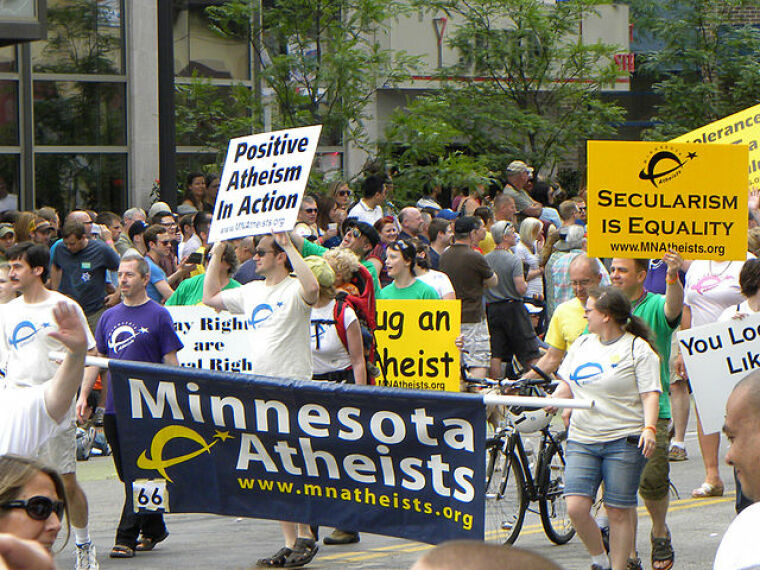'Nones' overtake Protestants, Catholics as largest social group in US, survey finds

A new survey has found that religious "nones" is now the largest social group in the U.S., overtaking Protestants and Catholics.
The American Family Survey, released on Nov. 16, has found that 34 percent of Americans now identify as atheist, agnostic or "nothing in particular." The findings make them the largest religious groups in the study, surpassing Protestants (33 percent) and Catholics (21 percent).
Other groups included in the research include Muslims, Jews (two percent), Mormons (one percent), Orthodox Christians (one percent), and Hindus (one percent), as well as those who said they were "something else" (four percent).
According to Religion News Service, the study, co-sponsored by Brigham Young University and the Deseret News, is aimed at measuring Americans' attitudes on a broad range of issues, including politics, health care, immigration and the challenges now facing the American family.
Christopher Karpowitz, one of the authors of the study, noted that there was a significant difference in the findings in this year's study compared to 2015 and 2016.
"When we first started doing this study in 2015, more than two-thirds of our respondents picked at least one cultural issue as being one of the three most important issues facing American families. Now there's been an 11-point increase in the percentage of people who say the biggest issues facing families are economic," he said.
The findings revealed that there is a religious divide among Americans when it comes to determining which are the most pressing issues.
Those who attend religious services regularly are more likely to point at cultural issues, with 72 percent being concerned about things like sexual permissiveness or falling religious attendance. Only 43 percent of those who attend frequently were concerned about the same issues. In contrast, almost seven in 10 secular respondents say they were concerned about the economy.
The findings also indicated a split in priorities between Trump and Clinton voters. Trump voters tend to agree with frequent religious attendees, being far more concerned about cultural issues than the economy.
Overall, the study suggested that Americans are more worried about the economy than they are about cultural decline.
Economic issues increased in importance from 51 percent to 62 percent, while cultural matters, such as sexual permissiveness, decline in religious faith, and drug use, decreased by 17 points from 68 percent to 51 percent.
The study also implied a link between mobile phone use and relationship problems. It found that more than four in 10 people who use their phones multiple times a day to check social media believe that their relationship is in trouble. In contrast, fewer than two in 10 of those who never use social media believe the same.
 Christians don't have to affirm transgenderism, but they can’t express that view at work: tribunal
Christians don't have to affirm transgenderism, but they can’t express that view at work: tribunal Archaeology discovery: Medieval Christian prayer beads found on Holy Island
Archaeology discovery: Medieval Christian prayer beads found on Holy Island Presbyterian Church in America votes to leave National Association of Evangelicals
Presbyterian Church in America votes to leave National Association of Evangelicals Over 50 killed in 'vile and satanic' attack at Nigerian church on Pentecost Sunday
Over 50 killed in 'vile and satanic' attack at Nigerian church on Pentecost Sunday Ukrainian Orthodox Church severs ties with Moscow over Patriarch Kirill's support for Putin's war
Ukrainian Orthodox Church severs ties with Moscow over Patriarch Kirill's support for Putin's war Islamic State kills 20 Nigerian Christians as revenge for US airstrike
Islamic State kills 20 Nigerian Christians as revenge for US airstrike Man who served 33 years in prison for murder leads inmates to Christ
Man who served 33 years in prison for murder leads inmates to Christ


 Nigerian student beaten to death, body burned over ‘blasphemous’ WhatsApp message
Nigerian student beaten to death, body burned over ‘blasphemous’ WhatsApp message 'A new low': World reacts after Hong Kong arrests 90-year-old Cardinal Joseph Zen
'A new low': World reacts after Hong Kong arrests 90-year-old Cardinal Joseph Zen Iran sentences Christian man to 10 years in prison for hosting house church worship gathering
Iran sentences Christian man to 10 years in prison for hosting house church worship gathering French Guyana: Pastor shot dead, church set on fire after meeting delegation of Evangelicals
French Guyana: Pastor shot dead, church set on fire after meeting delegation of Evangelicals ‘Talking Jesus’ report finds only 6% of UK adults identify as practicing Christians
‘Talking Jesus’ report finds only 6% of UK adults identify as practicing Christians Mission Eurasia ministry center blown up in Ukraine, hundreds of Bibles destroyed: 'God will provide'
Mission Eurasia ministry center blown up in Ukraine, hundreds of Bibles destroyed: 'God will provide' Church holds service for first time after ISIS desecrated it 8 years ago
Church holds service for first time after ISIS desecrated it 8 years ago Burger King apologizes for 'offensive campaign' using Jesus' words at the Last Supper
Burger King apologizes for 'offensive campaign' using Jesus' words at the Last Supper Uganda: Muslims abduct teacher, burn him inside mosque for praying in Christ’s name
Uganda: Muslims abduct teacher, burn him inside mosque for praying in Christ’s name